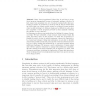Free Online Productivity Tools
i2Speak
i2Symbol
i2OCR
iTex2Img
iWeb2Print
iWeb2Shot
i2Type
iPdf2Split
iPdf2Merge
i2Bopomofo
i2Arabic
i2Style
i2Image
i2PDF
iLatex2Rtf
Sci2ools
119
Voted
ECOOP
1999
Springer
1999
Springer
Visualizing Reference Patterns for Solving Memory Leaks in Java
Many Java programmers believe they do not have to worry about memory management because of automatic garbage collection. In fact, many Java programs run out of memory unexpectedly after performing a number of operations. A memory leak in Java is caused when an object that is no longer needed cannot be reclaimed because another object is still referring to it. Memory leaks can be difficult to solve, since the complexity of most programs prevents us from manually verifying the validity of every reference. In this paper we show a new methodology for finding the causes of memory leaks. We have identified a basic memory leak scenario which fits many important cases. In this scenario, we allow the programmer to identify a period of time in which temporary objects are expected to be created and released. Using this information we are able to identify objects that persist beyond this period and the references which are holding on to them. Scaling this methodology to real-world systems bring...
| Added | 04 Aug 2010 |
| Updated | 04 Aug 2010 |
| Type | Conference |
| Year | 1999 |
| Where | ECOOP |
| Authors | Wim De Pauw, Gary Sevitsky |
Comments (0)

